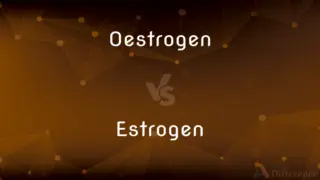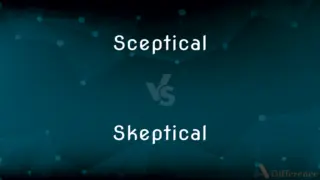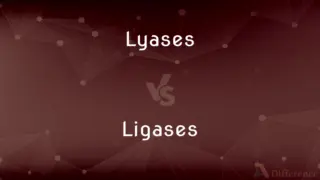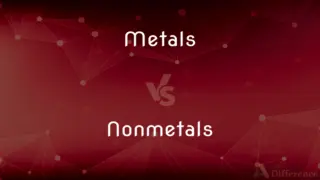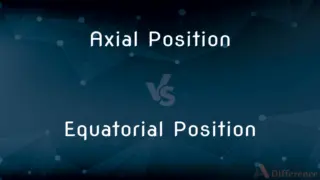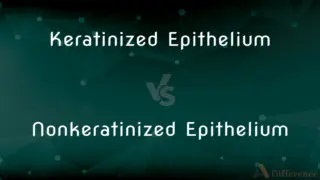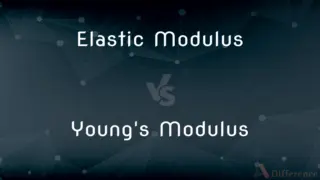Corrective Action vs. Preventive Action — What's the Difference?
By Tayyaba Rehman — Published on October 19, 2023
Corrective Action addresses existing issues, while Preventive Action proactively prevents potential issues.
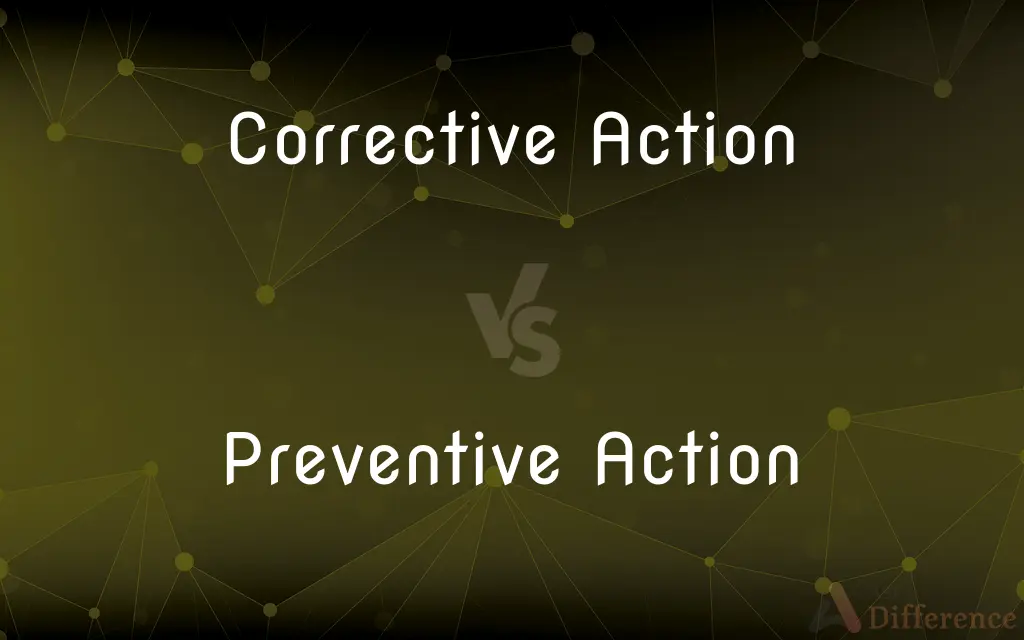
Difference Between Corrective Action and Preventive Action
Table of Contents
ADVERTISEMENT
Key Differences
Corrective Action and Preventive Action are both essential components in the realm of quality management, albeit with distinct focuses. Corrective Action pertains to the steps taken to rectify a problem that has already occurred. This could be a defect in a product, a breakdown in a process, or any other tangible issue. On the other hand, Preventive Action involves identifying potential problems and addressing them before they arise, ensuring they never materialize in the first place.
In many ways, Corrective Action can be seen as a reactive approach. Once a problem has been identified, the aim is to determine the root cause and then take necessary measures to correct it. The focus of Corrective Action is on the present situation, fixing what's currently wrong. In contrast, Preventive Action is a proactive strategy, centered around anticipating future challenges or defects and implementing strategies to ensure they are avoided.
It's worth noting that while Corrective Action deals with tangible, existing issues, Preventive Action often requires a deeper understanding and analysis of potential pitfalls. For instance, Corrective Action might involve fixing a malfunctioning machine in a production line. In contrast, Preventive Action might involve routine maintenance checks on that machine to ensure it doesn't break down in the first place.
Both Corrective Action and Preventive Action play crucial roles in ensuring consistent quality and reliability. Organizations often strive to find a balance between the two. While it's essential to address current issues with Corrective Action, it's equally vital to invest time and resources in Preventive Action to mitigate future challenges, ensuring long-term operational excellence.
Comparison Chart
Focus
Addresses existing issues.
Prevents potential issues.
ADVERTISEMENT
Nature
Reactive.
Proactive.
Point of Intervention
After a problem has occurred.
Before a potential problem arises.
Example Scenario
Fixing a broken machine.
Regular maintenance to prevent machine breakdown.
Key Benefit
Rectifies and resolves current defects or issues.
Reduces the likelihood of future defects or issues.
Compare with Definitions
Corrective Action
Addressing and remedying a present fault.
The team's quick Corrective Action saved the project from delays.
Preventive Action
Ensuring issues don't arise in the first place.
Preventive Action in quality control ensured product consistency.
Corrective Action
Measures to rectify a known issue.
Corrective Action was initiated to mend the company's damaged reputation.
Preventive Action
Proactive steps to avoid potential issues.
Regular system backups were a Preventive Action against data loss.
Corrective Action
Solutions to resolve identified challenges.
Upon receiving customer complaints, immediate Corrective Action was deployed.
Preventive Action
Measures taken to thwart possible problems.
Employee training served as a Preventive Action against workplace accidents.
Corrective Action
Steps taken to fix an existing problem.
After the product recall, the company took Corrective Action to address the defects.
Preventive Action
Anticipating and mitigating future risks.
In light of the forecasted storms, Preventive Action was taken to safeguard the facilities.
Corrective Action
Actions to amend a current defect or fault.
Post-audit, several areas were identified for Corrective Action.
Preventive Action
Strategies to avert potential pitfalls.
The company adopted a Preventive Action plan to combat future market downturns.
Common Curiosities
Which action is reactive in nature?
Corrective Action is reactive as it addresses issues after they have occurred.
Can Corrective Action and Preventive Action be used simultaneously?
Yes, organizations often utilize both Corrective Action for current issues and Preventive Action to avert future problems.
Which action anticipates future challenges?
Preventive Action anticipates and addresses potential future challenges.
Can Preventive Action involve training?
Yes, training can be a form of Preventive Action to equip employees with knowledge to avoid potential issues.
Can Preventive Action be based on historical data?
Yes, analyzing historical data can guide Preventive Action by identifying patterns or recurring issues.
What's an example of Corrective Action in manufacturing?
Addressing a faulty assembly line component that causes defects is an example of Corrective Action.
What's the main purpose of Corrective Action?
The main purpose of Corrective Action is to address and rectify existing problems or defects.
Why is Preventive Action important?
Preventive Action is important because it proactively prevents potential issues, saving time, resources, and maintaining quality.
Are Corrective Actions typically documented?
Yes, Corrective Actions are often documented to ensure accountability, effectiveness, and continuous improvement.
Why is it beneficial to invest in Preventive Action?
Investing in Preventive Action can reduce costs, improve quality, and prevent disruptions in the long run.
Is Preventive Action always successful in preventing issues?
Not always, but it significantly reduces the likelihood of potential problems arising.
What can trigger the need for Corrective Action?
Customer complaints, quality checks, or system failures can trigger the need for Corrective Action.
How do organizations determine when to use Corrective Action?
Organizations use Corrective Action when an existing problem or defect is identified and needs resolution.
Can Preventive Action be seen as a risk management strategy?
Yes, Preventive Action often involves identifying and mitigating potential risks before they materialize.
Is it more cost-effective to focus on Corrective Action or Preventive Action?
While both are essential, focusing on Preventive Action can be more cost-effective in the long run as it avoids the recurrence of issues.
Share Your Discovery

Previous Comparison
Eligibility vs. Qualification
Next Comparison
Single Entry System vs. Double Entry SystemAuthor Spotlight
Written by
Tayyaba RehmanTayyaba Rehman is a distinguished writer, currently serving as a primary contributor to askdifference.com. As a researcher in semantics and etymology, Tayyaba's passion for the complexity of languages and their distinctions has found a perfect home on the platform. Tayyaba delves into the intricacies of language, distinguishing between commonly confused words and phrases, thereby providing clarity for readers worldwide.




